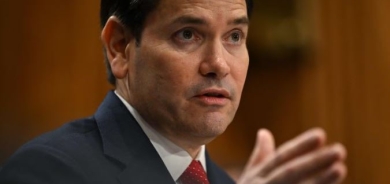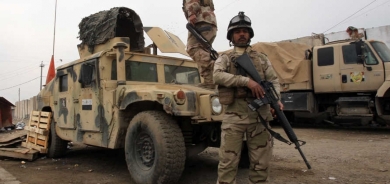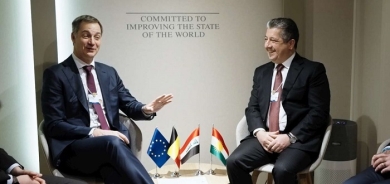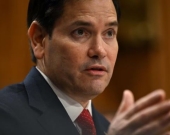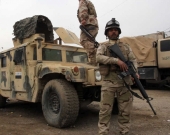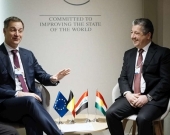UN Envoy Opposes Foreign Intervention in Libya

The newly appointed U.N. envoy to Libya said Tuesday he doesn't believe foreign intervention can halt the North African country's slide deeper into turmoil after mysterious airstrikes against Islamist militias prompted allegations that outside powers were trying to swing the fight.
The diplomat, Bernardino Leon, said that only an inclusive political process with all Libyans represented in parliament, government and other state institutions will end the chaos gripping the country more than three years after the uprising that forced longtime strongman Muammar Gadhafi from power.
"Foreign intervention whatsoever— because there are many types of intervention— any kind of intervention or foreign intervention won't help Libya get out of chaos," Leon said.
France, Germany, Italy, the United Kingdom and the United States raised similar concerns, saying in a joint statement that "outside interference in Libya exacerbates current divisions and undermines Libya's democratic transition."
The New York Times, citing unnamed American officials, reported in its Tuesday edition that Egypt and the United Arab Emirates secretly carried out airstrikes against Islamist militias inside Libya, which it said caught American officials off-guard.
American officials have not made similar claims publicly. Egypt has repeatedly denied involvement. Emirati officials have not commented.
Islamist militias in Libya have made similar allegations against Egypt and the Emirates following two days of mystery airstrikes against Islamist-allied militia positions in Libya's capital, Tripoli, since Aug. 18.
The strikes happened as Islamist-backed militias were fighting for control of Tripoli's international airport. Libyan officials have repeatedly called the airstrikes "foreign," and the country's air force likely does not have the capability to fly night sorties.
Libyan lawmakers recently voted to ask the United Nations to intervene in the ongoing militia battles throughout the country. These militias largely are comprised of the rebels who toppled and later killed Gadhafi in 2011.
Egyptian Foreign Minister Sameh Shukri on Tuesday strongly denied reports of an Egyptian role in the airstrikes, calling them "unsubstantiated rumors promoted until they become a reality."
Shukri said his country respects Libya's popular will and elected parliament, and supports its legitimacy and armed forces and will reach agreements on how to train them.
"But we have no direct connection to any of the military operations on the ground in Libya," Shukri said.
The Emirates and its Gulf neighbor Qatar played the most prominent Arab roles in the military intervention that helped lead to Gadhafi's ouster, with both sending warplanes to assist the NATO-led effort. They also provided humanitarian aid, and Qatar in particular played a major role as a supplier of weapons to rebel groups.
But the two countries — both important U.S. allies — today find themselves in opposing camps jostling for influence in the wake of the Arab Spring uprisings.
The Emirates, Saudi Arabia and Egypt under President Abdel-Fattah el-Sissi — who led the ouster of Islamist President Mohammed Morsi — are staunchly opposed to the Muslim Brotherhood, which they see as a threat to their ruling systems. Morsi hails from the Brotherhood, Egypt's largest Islamic group.
Qatar is far more accommodating to the Brotherhood and its allies, including Islamist factions fighting for power in Libya. It was a major backer of Morsi's government and is home to the leader of Hamas, an Islamist group that Israel and the West consider to be a terrorist organization.
Libya needs "a lot of international support" to back "Libyans who want to fight chaos ... through a political process." Leon, the U.N. diplomat said.
After June elections and formation of the new parliament, dominated by Islamists' opponents, the outgoing parliament reconvened and appointed a new prime minister. The move had no constitutional grounds and left Libya with two rival parliaments in different parts of the country, and two different governments.
Leon spoke in Cairo on Tuesday on his final trip as a European envoy to the region. He takes up his post as the UN special envoy to Libya next month. He was in Cairo following a meeting of diplomats from Libya's neighbors where there were calls for an international push to disarm its myriads of militias.
He said Libya's neighbors are in a better position to assess what is going on and to take decisions on ways to support a political process.
"We all agreed that more conflict, more use of force will not help Libya get out of the current chaos," he said, which would also impact countries in the region, in Europe and beyond.
Libya's divisions are rooted in rivalries between Islamists and non-Islamists, as well as powerful tribal and regional allegiances between groups who quickly filled the power vacuum the fall of longtime dictator Moammar Gadhafi. Successive transitional governments have failed to control them.
The formation of a new government by the Islamist-dominated outgoing parliament came on the grounds that a handover of authority earlier this month was improperly handled. However, Libya's court system and laws remain in disarray, meaning whoever has the guns has the power.
The political rivalry has been coupled with militia infighting that has scarred the capital and driven out thousands of its residents. It has also turned Benghazi into a battlefield between Islamist militias and fighters loyal to a renegade army general who vowed to weed them out.
To cap the violence, some Libyan lawmakers have called for U.N. intervention to help stabilize the country, awash with weapons and dominated by rival militias and allied political groups.
Emirati officials have not commented on the reports that they were behind the airstrikes. But it would not be unfamiliar territory if they were involved.
During Libya's uprising, the Emirates provided 12 American and French-made fighter planes to help enforce the no-fly zone over the country, lending crucial Arab support to what was largely a Western military effort. One of the planes crashed on landing in Sicily as it was returning from a mission, but the pilot ejected safely.
———
Schreck reported from Dubai, United Arab Emirates. Sarah El Deeb and Jon Gambrell contributed reporting from Cairo.


